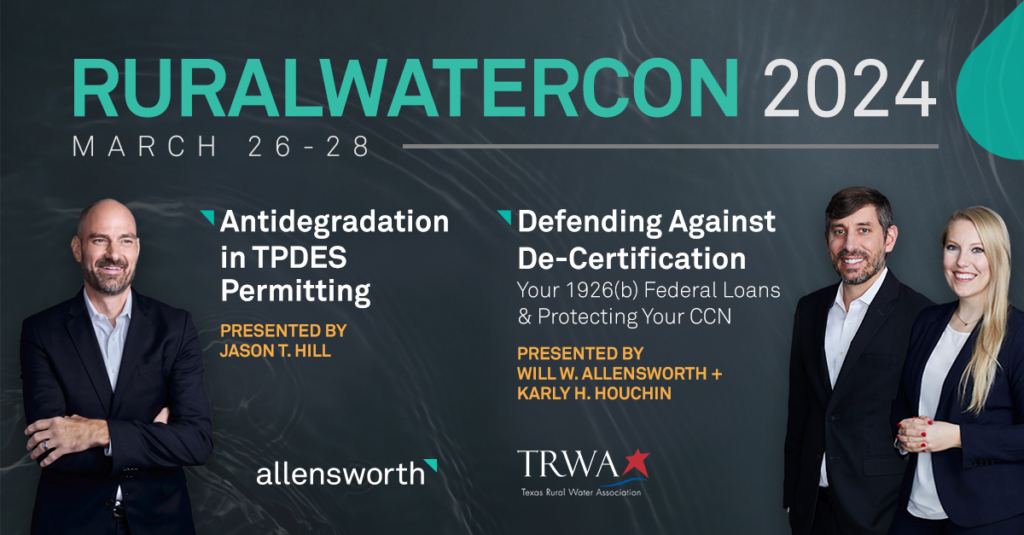Allensworth Attorneys Present at RuralWaterCon 2024
Jason T. Hill will present on Antidegradation in TPDES Permitting. Karly A. Houchin and Will W. Allensworth will present on Defending Against De-Certification: Your 1926(b) Federal Loans and Protecting Your CCN

Antidegradation in TPDEX Permitting, presented by Jason T. Hill
Long-range water supply planning is the belle of the ball of water resources management in Texas. Planning for future wastewater treatment capacity needs doesn’t always get the same attention. The consequences of insufficient capacity in rapid-growth areas, however, can hobble utilities, stifle economic development, and fundamentally affect entire communities seemingly overnight. For years, the antidegradation rules have garnered less attention in TPDES permit applications than have numeric permitting limits and other criteria. Times have changed. Tier 2 of the antidegradation rule is starting to be seen by many wastewater discharge opponents as an exposed vein for TCEQ and permit applicants. When front-and-center, it can create additional obstacles to TPDES permitting efforts when time is truly of the essence. The Tier 2 rule generally prohibits the lowering of water quality by more than a de minimis extent, but agency rules notably provide no numeric criteria for degradation and no definition of de minimis. The prohibition has an oft-overlooked exception; discharges that cause degradation can be allowed when necessary for “important economic and social development.” TCEQ rules provide little guidance on the scope of this criteria, as well. Applicants can be left largely fending for themselves on what has become one of the most complex and contested issues in TPDES permitting.
Participants will leave this presentation understanding the growing role of Tier 2 in TPDES permitting—what it means, when it applies, and how the TCEQ and courts are addressing it, as well as the Tier 2 economic and social development exception. This includes how jurisdictions outside of Texas have applied it, how building moratoria spawned by permit challenges can create a case for it, and what economic and social development impacts can look like.
Defending Against De-Certification: Your 1926(b) Federal Loans and Protecting your CCN, co-presented by Will W. Allensworth and Karly A. Houchin
What happens when a developer wants their land released from a federally indebted water supplier’s CCN? This presentation addresses an increasingly common scenario where water suppliers file suit to enforce their 1926(b) rights, and to resist developers’ efforts to remove territory from the borrower’s CCN. When a water supplier receives loans guaranteed or issued by the USDA, the water supplier’s CCN territory becomes collateral for those federal loans. And the water supplier is obligated to protect that territory. By taking out the federal loans, the CCN territory is then federally protected from encroachment and curtailment by any other water service provider so long as the water supplier can “make service available within a reasonable amount of time after a request for service is made.” The Fifth Circuit’s 2020 Green Valley opinion significantly changed the standard for determining when 1926(b) protection applies to territory in a water supplier’s CCN. Every water supplier who has federal loans should be aware of the Green Valley test as the current law of the land.
Participants will leave this presentation understanding the Green Valley test and how these 1926(b) territorial disputes play out—from intervening in the administrative proceeding, to filing a federal lawsuit, litigation costs, and the hurdles to resolving and settling these cases. The presentation will emphasize the consequences of having to preserve territory through litigation, including the economic costs and the time and practical effects on the borrower’s operations, staff, and Board.